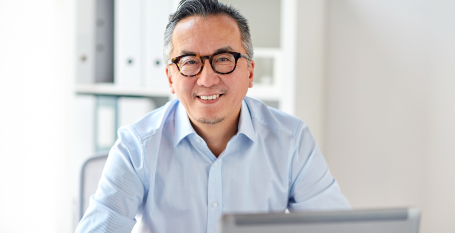The available research suggests that gay men aged 55 or over are less likely to be confident about disclosing their sexuality at work compared to those in the 25–55 age range.
It’s generally acknowledged that, if possible, it’s best to be completely authentic in every aspect of your life – you’ll perform at your best and engage at a deeper level with the people that you’re working with if you let them get to know you, to understand you, and to trust you.
So, what’s holding older gay men back from being open about who they are?
It’s easy to mistakenly interpret other people’s actions through your own experiences. Although there’s a lot of common themes and familiar milestones, each gay man’s journey of self-discovery is unique and individual. While we can make some generalisations about why specific age-groups respond in certain ways, it’s the personal stories that really illustrate how the world around us shapes our lives.
To be aged 55 or above, you probably started your working life sometime in the early 1980s.
Let’s just re-cap – from an LGBTQ perspective – what was going around that time:
- 1970: The first gay liberation march was held in New York
- 1973: The American Psychiatric Association removed homosexuality from its manual of mental disorders
- 1974: The first openly LGBTQ telephone helpline opened in London
- 1978: Harvey Milk – one of the few openly gay politicians in the US – was assassinated in San Francisco
- 1978: The first Sydney Gay and Lesbian Mardi Gras was held
- It wasn’t until 1988 that Sweden became the first country to pass laws protecting the rights of gay men regarding social services, taxes, and inheritances.
- If you began your working life in the early 1980s – when homosexuality was either a criminal offence or at the very least severely career limiting – it’s highly likely that you would have created a closeted identity for yourself at work.
It really isn’t a surprise then that this older generation sometimes struggles to adapt to a changed environment.
In the early 1980s, it would have been hard to imagine that we would one day create a world where gay characters are portrayed in a positive light on television, professional sportspeople can be openly gay, and large companies compete to demonstrate that they are actively supporting their LGBTQ employees.
Once you’ve worked hard to create a plausible closeted identity with your employer, your colleagues, your clients and your professional networks, it eventually becomes almost impossible to unwind that and suddenly reveal your true self.
I spoke with Dr Cindy Holden, a general practitioner working in Melbourne, about what sort of personal impact that this type of workplace experience could have on older gay men.
"There are potential mental health impacts in this type of situation…” explained Dr Holden. “Older gay men could be at risk of feeling socially isolated at work which may in turn impact on their personal confidence and job performance. With the current economic climate and society’s obsession with youth, people in this age group may be feeling extra vulnerable and therefore more at risk of developing symptoms of anxiety and depression. Adding to the stress levels may be some of the general issues facing those over 55, such as a possible increase in their own physical health problems, and social factors like caring for ageing parents.”
While many companies and large employers are working hard to support and engage with their LGBTQ employees, there appears to be little evidence of organisations directing resources to address the specific needs of older LGBTQ employees.
What we tend to see is a one-size-fits-all approach. With older employees being more reserved and less-likely to be confident about articulating their needs, it’s easy to see how older employees continue to be over-looked in the workplace.
While LGBTQ employee networks are a good first point of call for older LGBTQ employees seeking support, information and advice or just some new social opportunities, the members of these networks may not necessarily understand or appreciate what the workplace experience has been like for someone aged 55 or over. A failure to connect in this way with younger LGBTQ colleagues could potentially exacerbate the challenges faced by older gay men trying to navigate the changing workplace environment.
Dr Holden advises that the important thing is to reach out and ask for help.
"If feeling isolated or vulnerable, older LGBTQ people should speak with their doctor for a non-judgemental discussion and for advice about how to access help such as locally-based counselling services, or support groups...” says Dr Holden. “There’s also a range of online resources available, which some people may find an easier starting point.”












 列印版本
列印版本

















讀者回應
I feel for all the others in my age and generation and would only tell the young guys now a days how much easier it is for them, Ive seen it first hand. Hopefully someday I too can come out fully and be who I am inside. Thanks for the article.
請先登入再使用此功能。